|
 This year the offices of Logan County
Circuit Clerk, Logan County Coroner, and Logan County Resident Judge
are up for grabs. In each of these three offices there are two
Republicans running for the nomination to be placed on the November
ballot. There are no Democrats running for local positions in the
primary, so ultimately the primary election becomes the most
important of the two 2020 elections for these local positions. This year the offices of Logan County
Circuit Clerk, Logan County Coroner, and Logan County Resident Judge
are up for grabs. In each of these three offices there are two
Republicans running for the nomination to be placed on the November
ballot. There are no Democrats running for local positions in the
primary, so ultimately the primary election becomes the most
important of the two 2020 elections for these local positions.
Contestants in alphabetical order for the office of Logan County
Circuit Clerk are Kelly Elias and Bethany Rademaker; for the office
of Logan County Coroner - Don Peasely and Chris Sprague and in the
race for Resident Judge - William 'Bill' Workman and Jonathan
Wright. Within these races the only ‘incumbent” is Jonathan Wright,
who currently serves as the resident judge by appointment.
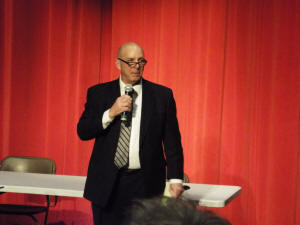
The Thursday night event was emceed by Jim Drew, who
is the Central Committee Chairman this year. Serving as moderators
and posing questions to the candidates were Lisa Drew and Kathryn
Schmidt. Chuck Conzo served as the time keeper.

Candidates were called to the stage in pairs according to the
nomination they were seeking. First up was Bethany Rademaker and
Kelly Elias for Logan County Circuit Clerk.
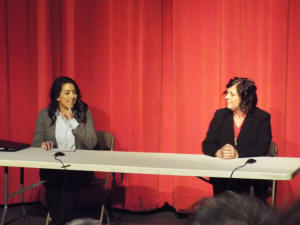
Elias and Rademaker
Each candidate was given two minutes for a self-introduction.
Rademaker used her time to speak about her personal background, her
life in Lincoln and Logan County, education, family, and community
involvement.
Elias went a slightly different route, first talking about Mary
Kelley, who is retiring and has served the county for the past 43
years. She talked about working with Kelley to keep the office of
the circuit clerk moving forward and into the 21st century. She
spoke about the modernization of the office and the use of
technology to make the office more efficient.
The questions posed to the candidates came from the audience. Those
questions included offering up a definition of the job of circuit
clerk, why each candidate feels they are the best one for the job,
the challenges that will come with the transition to a new clerk and
issues that clerk will have to face straight away.
Candidates took turns being the first to answer the questions. The
first to answer had two minutes to give an answer then also was
given an additional one minute at the end for rebuttal to the
answers of the second candidate.
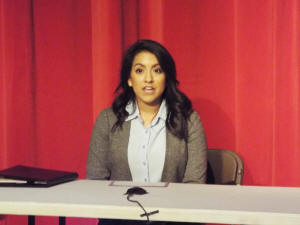
On the first question, Rademaker answered first and
read the job description from the county website.
Elias said that in addition to the job description there is a good
deal of customer service and human interaction that comes with the
job and that there are daily duties that don’t fall within the
written words, but none the less are vital to the successful
management of the office.

When asked candidates were asked why they were the best choice for
the job, Elias was the first to answer. She talked about her
experience in the office, the knowledge she has gained from working
with Mary Kelley and the specialized training she has received as a
result of working for the Circuit Clerk.
Rademaker leaned on her education as her best qualifying factor
coupled with her work experience. She also noted her youth, saying
she was one who would be available to serve the county for many
terms.
When asked about issues that would need to be addressed immediately
in the office, Rademaker said the issues first would be to assure
the smooth transition and secondly to start strategic planning for
the future of the office.
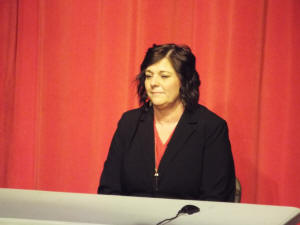
Elias said she felt that with her in office, the
transition would not be an issue, it would go smoothly and
seamlessly. She added that the office was very well run today, and
she didn’t see any big issues that would have to be addressed.
Asked what the biggest challenges would be Elias was the first to
answer and said that there are issues every day and that things are
always changing and must be addressed as it happens. She said that
she didn’t see any big issues that would come up right away.
Rademaker said the big challenges would be to first trim the budget
of the office, and secondly to keep up with technology.
Elias used her rebuttal time and said that she would not be trimming
the budget. She added that many of the duties and tasks of the
office are mandated and that the office is running as trim as it
can. She said the office would work with the money it gets, but it
would not be looking to reduce dollars intentionally because
everything they receive is necessary for the efficient management of
the office.
The candidates were asked about the financial needs and hardships of
the county, and Rademaker again said that the Circuit Clerks Office
should look at its budget. She conceded that the reductions in
budget might not be big, but they could still be helpful.
Elias said that the office would work with what it gets, but she
felt that a key factor to the future of the budget on the whole was
going to be the passing or failure of the courthouse tax referendum.
Throughout their question and answer session the two women leaned on
their individual strengths. Rademaker made note on a number of
occasions that she had the education needed to perform the job well.
Elias said that while she did not have a college degree, she had a
wealth of experience and had been a “sponge” soaking in the
knowledge of Mary Kelley and storing it away for her own term in
office.
Both women agreed that moving forward the office would maintain its
website, utilize news media for public information and would not be
integrating a social media component into the office.
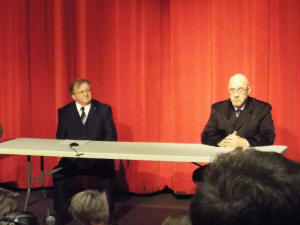
Peasley and Sprague
During introductions, Sprague spoke first addressing his years of
experience with the current Logan County Coroner. He noted that it
was his intent to do only the coroners job with no other jobs on the
side. He shared that he was already a “Certified Coroner.”
Peasley spoke about his history in the community, a lifelong
resident, his history working for and then owning and managing area
funeral homes and his community involvement. He noted that he has
also had EMT training and was a certified EMT for a number of years.
The two were asked questions such as what made each one qualified
for the office and what are the duties of the office.
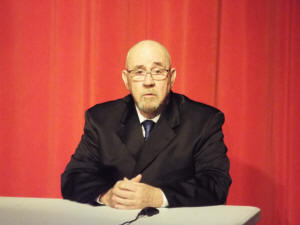
Sprague noted his years of experience along with
education as his qualifying factors. Peasely noted his experience as
a funeral director plus education in grief counseling and
psychology.
Talking about the duties of the coroner, Peasley noted that the
coroner views the scene, offers the determination if an autopsy is
needed, and provides the official cause of death. Sprague added to
that saying that there is a great deal of record gathering that has
to be done and that the notification process for locating the next
of kin can be very complicated and time consuming.
The two had decidedly different opinions on the question posed as to
whether or not a coroner should also be a funeral director. Sprague
was the first to answer and said no. He said that having a funeral
director for a coroner would put family in an awkward position. It
would be difficult for them to seek help and advice from the coroner
when the coroner was the manager of a funeral home. [to
top of second column] |
 Peasely said that in Illinois a large
percentage of the coroners are also funeral directors and it works
out fine. He said he personally would show no bias toward his own
business when speaking to family of a deceased. He said he would
offer them all the options available without consideration for his
business. Sprague used his
rebuttal time to note that there are eleven counties in Illinois
approximately the same size as Logan. In those eleven counties, only
two have coroners who are also funeral directors.
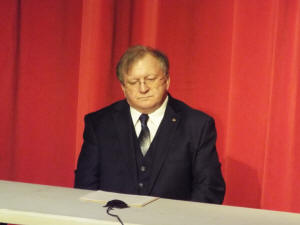
Asked what issues would need to be addressed in the
Office of Coroner, Peasely said that the first thing he would want
to do would be get rid of the current coroner vans. He said first
the primary van was too large. He said when transporting to
Bloomington for autopsies, the van cannot get close enough to the
entrance to assure privacy when delivering a corpse into the
building.
He added that the coroner’s office has two vans and it doesn’t need
two, one will suffice. Sprague
disagreed whole heartedly saying that the “big rig” that the
coroner’s office has is set up for forensic work. While Peasley
noted that other counties didn’t have that big of vehicle, Sprague
countered that Logan County does not have a Crime Scene
Investigation vehicle that other counties do. He also noted that the
larger vehicle, plus the second allows for faster transport of
multiple victims, and he noted the airplane crash last week as a
prime example of multiple victims. He said there were also many a
time when working with Coroner Thomas that the coroner would be
traveling to one location while Sprague was headed to another. He
said two vehicles were necessary and provided quicker service to
loved ones.
In response to other questions, both men reported they were in good
health and get regular check-ups. They also agreed that the
coroner’s office is no place for social media and said they would
utilize local media sources to inform the public as needed.

They both agreed that working a crime scene meant following the lead
of the law enforcement agency in charge and being beyond careful to
follow proper procedure so as not to contaminate or compromise
evidence.
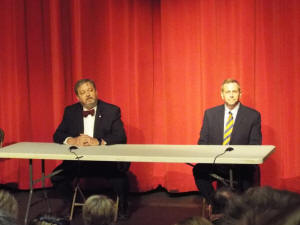
Workman and Wright
Of the three sets of candidates the two who were possibly the most
cordial toward one another and most “on the same page” in their
answers were Judge Workman and Judge Wright.
Jonathan Wright is currently serving by appointment as the resident
judge for Logan County. Workman is an associate judge currently
assigned to Logan County.
Questions were each asked about their future if the other wins the
resident seat. Wright said that Judge Workman if not elected would
be continuing on as an associate judge. Workman said that was the
case, but the difference was that at any time he could be reassigned
to another county. As a resident judge, he will only serve in Logan
and that is what his ultimate goal is, to stay in his home
community.
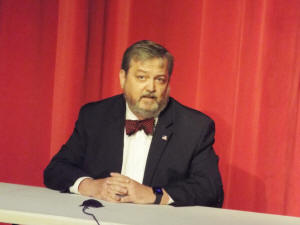
Asked about serving more than one six-year term, both
agreed they wanted to serve long-term. Workman, who is in his early
sixties noted that a judge may hold his seat until age 75 so he was
looking forward to at least serving two terms and perhaps a bit
beyond.
The men were asked their position on gay marriage. Both agreed that
their job is to follow the letter of the law and the law states that
same sex civil unions are legal in Illinois. Workman noted that he
is the only judge in Logan County who will perform a same sex
marriage. However, Wright countered that the assignment to perform
civil unions comes from a higher authority and that Workman was
assigned to the duty.

One question appeared to be seeking to raise a controversy, but
neither candidate took the bait. The question was pointed directly
at Judge Wright pertaining to nepotism and the fact Wright’s
daughters work for the county. Should that be permissible?

Wright said that he felt that the question did not
pertain to the role of the circuit judge and did not justify an
answer. Wright went on to say that he was very proud of his
daughters and the decisions they are making for their lives. He
supports them in whatever career choices they might make.
Workman agreed that the question was not worth debate. He added that
all positions within the county are open to the public and Wright's
daughters are a part of that public and deserve to be treated as
such.
Both men agreed that the role of the resident judge includes making
sure that defendant parties are treated with respect and are spoken
to in language they can understand. Wright noted that people are
much more able to accept a judge’s decision when it is explained to
them and justified by law in understandable terms, regardless of the
final outcome. Wright said that most people don’t want to hear
“legalese.” They want explanations that they can relate to and
understand.
Workman agreed and added that in the courts they are seeing more
self-representation. It is important to be respectful of that and to
make sure that the person or persons have a clear understanding and
that they get help as needed. He added that while he can’t and
wouldn’t litigate for them, he can make sure they are not taken
advantage of.
Asked what the biggest challenges of the office will be, Wright said
that making sure that self-litigants have access to knowledge is
going to become more important. He talked about providing law
library access for those litigants. He added that modernization of
recording and reporting in the courtroom is ongoing and will
continue to be a challenge.
Workman agreed saying that technology in the courtroom and in the
judge’s office must continue to move forward and that work toward a
paperless judicial system must also continue.
It was noted that Logan County is ahead of schedule on going
electronic with much of the work already done.
Brad Hauge
Brad Hauge is the currently Logan County State’s Attorney by
appointment. He filled the position when Judge Wright accepted his
appointment as Resident Circuit Judge for Logan County.
Hauge is running unopposed for State’s Attorney. On Thursday
evening, he came to the stage only for a brief moment, introducing
himself and speaking about his desire to be elected to the State’s
Attorney position.
When Hauge was finished, Jim Drew thanked guests for attending,
adding that there were refreshments in the lobby and all the
candidates were going to be staying around for a bit for one-on-one
conversations.
The turnout on Thursday evening was not huge. The auditorium at the
Johnston Center for Performing Arts was less than half filled, but
those who were in attendance seemed to appreciate the process. Some
did say that the debates had assisted them in making a decision for
March 17th.
The Primary Election will be held on March 17.
The Logan County Clerk’s office has provided several informative
press releases about the primary as well as sample ballots for the
Democrat, Nonpartisan, and Republican voters. All that information
is gathered together in Lincoln Daily News.
Click here to review.
Lincoln Daily News also has published the position statements of
candidates Elias, Hauge, Rademaker, Sprague, Workman and Wright.
Click here to review.
A large number of people have submitted letters of support for
individual candidates and those letters are still coming in daily.
All those letters are located in one place in the Where they Stand
section of Lincoln Daily News.
Click here to review. This section also includes letters of
support for the Courthouse Tax Referendum.
The public is encouraged to review and self-educate on the
candidates and make their voices heard through the election process
on March 17th.
[Nila Smith] |